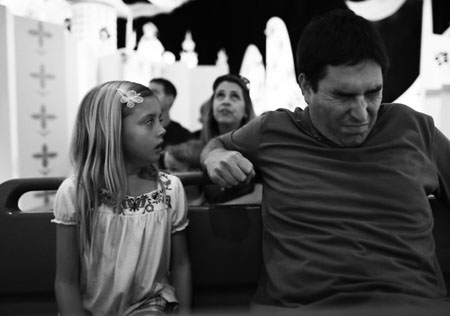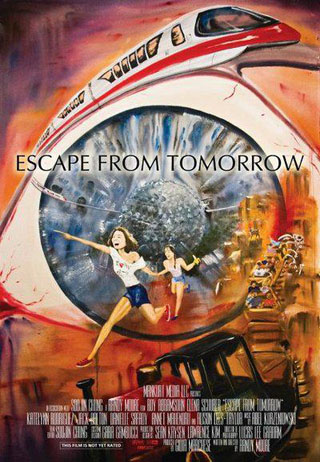Randy Moore’s Escape from Tomorrow is “easily the most jaw-dropping film I’ve ever seen at a film festival,” declares Filmmaker editor Scott Macaulay:
The film is like a bad acid trip version of National Lampoon’s Vacation, but with Wally World substituted by the real thing. At the film’s start, forty-something parent Jim is midway through his vacation at Orlando’s Walt Disney World with his wife and young son and daughter when he gets a phone call. He’s lost his job. Hiding this fact from his wife, who immediately suspects something’s up, he says he just wants to have a good last two days with the family. But soon both Jim and the film become increasingly deranged. He quarrels with his overbearing wife and becomes obsessed with two flirty French teenagers, inappropriately stalking them across the park with his young son by his side. An encounter with a fellow parent leads to bondage sex in her hotel room. Disney princesses are revealed to be high-priced escorts, toxic cat flu infects the park, and, by the end, Disney World is inflected with the sinister menace of Overlook Hotel….
What has made Escape from Tomorrow the talk of Sundance, however, is not just its story but the story of its making. Moore shot this film guerrilla-style, secretly filming his actors without releases from Disney, its performers, or all the park visitors who are included in many shots. And just to be clear—this is no sloppily-made mumblecore improv-fest. Escape from Tomorrow has a large cast, a DP, and assistant directors. It’s even got crane shots (although those were craftily executed, I realized, in a matching location.)
You don’t have to be an expert on copyright and intellectual property to realize the outlaw nature of this project, and it’s that realization that gives this film its added kick.
In the Los Angeles Times, Steven Zeitchik talks with Moore, who tells him the story of the film’s making, but first, he, too, has an attention-grabbing declaration to make: “It is one of the strangest and most provocative movies this reporter has seen in eight years attending the Sundance Film Festival. And it may well never be viewed by a commercial audience…. The film’s rights are being represented by Cinetic Media, which has sold high-profile Sundance titles such as Precious and Napoleon Dynamite as well enigmatic fare such as 2010 Banksy movie Exit Through the Gift Shop. The company’s principal, John Sloss, declined comment for this story, but the feeling in distribution circles is that the movie will have a legal Everest to climb. While trying to censor an independent film tends to blow up in a conglomerate’s face, it would be hard to imagine how Disney would ever allow this film to see the light of day. A Disney spokesperson did not return an immediate message seeking comment; it is not clear how aware they are of the movie.”
The New York Times‘ Brooks Barnes has tried to contact Disney as well, but: “no comment…. Still, there were moments during filming that Disney clearly knew something was up, Mr. Moore said. ‘I think they probably just thought we were crazy fans making a YouTube video, which is something that happens a fair amount,’ he said. He added, ‘Look, I have amazing memories as a kid from going to the parks. I think Walt Disney was a genius. I just wish his vision hadn’t grown into something quite so corporate.'”
“I grew up in Florida,” writes HitFix‘s Drew McWeeney, “and I have been going to Walt Disney World my entire life. I worked at that park. I’ve been there as a child, as a teenager, as an employee, and as a parent. I’ve done Disney sitting on my father’s shoulders, and I’ve done the Disney parks with my kids sitting on my shoulders. It is a huge part of my DNA, and I can tell you that there is no way Randy Moore pulled off what I saw tonight. It is a film that should not exist by any rational definition. And yet… not only does it exist, but it’s fascinating.”
“Beyond the issue of whether or not it has the legal right to exist, however, Escape from Tomorrow displays a fascinating ingenuity in its appropriation of the Disney brand,” writes Indiewire‘s Eric Kohn. “Good luck picking through the fragments, but even when it doesn’t entirely add up, Escape From Tomorrow manages to make each disorienting moment count, and the payoff is intensely engaging: a quasi-science fiction climax set against nighttime fireworks and pulpy B-movie clichés rendered in a cavalcade of baffling mayhem.”
Dan Schoenbrun has five questions for Moore at Filmmaker; Indiewire gets a few words with him as well. Escape from Tomorrow‘s screened in the NEXT section.
Updates, 1/24: “Moore’s movie can be seen as a kind of meta-project, or a one-week-only objet d’art, or a deliberate challenge to corporate hegemony—all of which is fascinating,” grants James Rocchi at MSN, “but also obscures the more important question of if the film is any good. And quibbling about the editing and plot of a movie with more bravado and brass-blunt bravery than you can imagine may sound like complaining that the unicorn you saw was the wrong color, Escape from Tomorrow‘s surrealist mix of hallucination and conspiracy, family drama and cultural critique could do with a good firm-handed time-reducing edit and a little more clarity and completion in its loopy, lunatic plot. With its pop-culture setting and paranoid extremes, family dynamics and anti-corporate concerns, Escape from Tomorrow plays like the Don DeLillo novel Don DeLillo never wrote…. Like any day at any theme park, Escape from Tomorrow starts to sag and grind its feet, your giddy rush towards its diversions and games turning into the trudging, sugar-crash ‘Can we go home yet?’ feeling by the end.”
“Escape has drawn a few comparisons to Todd Haynes’s samizdat Superstar: The Karen Carpenter Story,” notes Sam Adams at the AV Club. “But the likeness goes deeper than mere provocation. Like Haynes, Moore is waging an all-out assault on a cultural icon, flipping the polarities so what normally attracts repulses, and vice-versa. Its extralegal production style, which required substantial rerecording of dialogue and the use of green screen, lends a sense of disassociation more akin to Haynes’s Poison, which like Escape is essentially a semiotics thesis masquerading as a loose narrative. It has plenty of rough edges, but its climax hits like a confetti-filled shotgun.”
It’s “like if Tarkovsky directed an episode of The Simpsons, featuring demon children, invasive alien flus, Disney princesses-as-high priced escorts, leggy French fairies and explosive diarrhea,” proposes Alicia Van Couvering in Filmmaker. “It is a deeply insane movie about the deeply insane experience of corporate entertainment.”
It’s “essentially a horror film set in the happiest place on earth,” adds Time Out New York‘s David Fear.
William Goss at the Playlist: “Moore’s movie may not seem to make much sense—visitors unwittingly look into the camera, green-screen work is used to duplicate the park experience, and the story is frankly bugnuts throughout—but he does set up bits at the beginning that do come to pay off in ridiculous ways, and cinematographer Lucas Lee Graham pulls off the commendable feat of shooting the film with some margin of legitimate composition in spite of the crew’s apparent guerrilla antics. Furthermore, composer Abel Korzeniowski (A Single Man) was somehow enlisted to contribute a score of unlikely grandeur that suits the surreal aesthetic contrasts of squeaky-clean Disney and middle-aged madness nicely.”
“Truth be told,” writes Eric D. Snider at Movies.com, “Escape from Tomorrow is more valuable as an artifact and an experiment than it is as entertainment. Even allowing for the difficulty of getting good performances from actors who are working under unusual conditions, and only having two or three takes to get it right before Disney security notices you, the acting is mediocre at best. There’s sublime lunacy in the crazier plot points, and the story goes to some dark places…. But often, apart from the thrill that comes from knowing we’re watching something that was shot surreptitiously, the story itself is not very engaging.”
At Movie City News, Kim Voynar finds it “stronger in concept than execution… But one of the great things about this festival is that the programming often takes risks that other fests don’t, and you sometimes get to stumble upon something that, while flawed, still shows a brilliance and originality that’s lacking from so much of low-budget indie film. For that it’s absolutely deserving of some accolades.”
“Escape from Tomorrow isn’t the first festival ‘buzz’ title whose making-of story is considerably more interesting than the movie itself,” writes the Voice‘s Scott Foundas, “though it may be the most tedious since the George W. Bush assassination docudrama Death of a President sucked up several days’ worth of oxygen at the 2006 Toronto Film Festival. Resembling a cross between a YouTube vacation video and a film student’s overheated Eraserhead homage, the black-and-white Tomorrow carries a certain novelty value for 10 or 15 minutes… Some have speculated that Disney will go out of its way to make sure Moore’s film is never widely released. I speculate that this goal can be accomplished without Disney lifting a finger.”
But at Film.com, Jordan Hoffman argues that Escape is “both a great gimmick-dependent story and a remarkable piece of filmmaking. It is a radical, transgressive departure that exploits new technology in heretofore unseen ways, but if it were also done ‘legit’ (either with permission or in a nameless amusement park), it would still be good. It is a major film, one that will be celebrated by cultists, pirates and wise guys for decades.”
The Film Society of Lincoln Center’s Eugene Hernandez interviews Moore.
Updates, 1/26: “Randy Moore’s debut feature comes on like a queasy-making Carnival of Souls for the Occupy era, its stylistic flaws seeming wholly forgivable in the context of David’s sidesplitting poke at Goliath,” writes Rob Nelson in Variety.
“As strange and vaguely intriguing as some of [the] incidents might be, most of the running time is devoted to seemingly arbitrary footage or random asides, to the point where exasperation forces the question of when something—anything—interesting or genuinely subversive is going to happen,” writes Todd McCarthy in the Hollywood Reporter. “Even as a quasi-experimental work of subjective surrealism, Escape from Tomorrow is massively erratic and isn’t particularly original. But it must also be said that its take on Disney World, as well as many of its individual images, are indelible and won’t be easily forgotten.”
“I can’t shake the feeling that Escape from Tomorrow might have been the best 20-minute short film ever made,” writes Brian Tallerico at Film Threat. “Get in, get creepy, get out.”
Updates, 2/3: “The acting isn’t perfect,” writes Damon Wise in the Guardian, “and the film’s dream states sometimes try too hard, but Escape From Tomorrow has an otherworldly atmosphere that both hooks and engages.”
For John Wildman, dispatching to Film Comment, “as the story plays out, it becomes creepy and haunting like”—again—”a next-generation Carnival of Souls.”
David D’Arcy notes that Columbia Law Professor Tim Wu has argued at the New Yorker‘s Culture Desk that “the film can be shown, as ‘commentary’ and ‘parody.'”
Indiewire‘s Eric Kohn interviews Moore, and CriterionCast notes that Abel Korzeniowski’s score is now available on iTunes.
Sundance 2013: Index to our reviews, reports, and coverage of the coverage. For news and tips throughout the day every day, follow @KeyframeDaily on Twitter and/or the RSS feed. Get Keyframe Daily in your inbox by signing in at fandor.com/daily.






